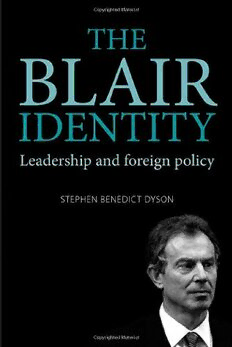
The Blair Identity: Leadership and Foreign Policy PDF
Preview The Blair Identity: Leadership and Foreign Policy
The Blair identity The Blair identity Leadership and foreign policy Stephen Benedict Dyson Manchester University Press Manchester and New York distributed in the United States exclusively by Palgrave Macmillan Copyright © Stephen Benedict Dyson 2009 The right of Stephen Benedict Dyson to be identified as the author of this work has been asserted by him in accordance with the Copyright, Designs and Patents Act 1988. Published byManchester University Press Oxford Road, Manchester M13 9NR, UK andRoom 400, 175 Fifth Avenue, New York, NY 10010, USA www.manchesteruniversitypress.co.uk Distributed exclusively in the USA by Palgrave Macmillan, 175 Fifth Avenue, New York, NY 10010, USA Distributed exclusively in Canada by UBC Press, University of British Columbia, 2029 West Mall Vancouver, BC, Canada V6T 1Z2 British Library Cataloguing-in-Publication Data Acatalogue record for this book is available from the British Library Libraryof Congress Cataloging-in-Publication Data applied for ISBN 978 0 7190 7999 3 hardback First published 2009 18 17 16 15 14 13 12 11 10 09 10 9 8 7 6 5 4 3 2 1 The publisher has no responsibility for the persistence or accuracy of URLs for external oranythird-party internet websites referred to in this book, and does not gurantee that any content on such websites is, or will remain, accurate or appropriate. Typeset by Helen Skelton, Brighton, UK Printed in Great Britain by CPI Antony Rowe Ltd, Chippenham, Wiltshire Contents List of tables page vii 1 Blair’s wars 1 2 Neoclassical realism and leader psychology: 10 a theory of foreign policy 3 Tony Blair’s personality and leadership style 25 4 The Kosovo and Sierra Leone interventions 47 5 September 11 and the ‘war on terror’ 70 6 Iraq – Blair’s war 98 7 Postwar Iraq 132 8 The Blair balance sheet 150 Index 161 List of tables 3.1 Tony Blair’s trait scores and a reference group page 33 of post-1945 British prime ministers 8.1 Predictions and evidence from realist and 153 personality variables: summary of the argument 1 Blair’s wars Secluded in his private Downing Street study and facing the most fateful decisions of his political career, Prime Minister Tony Blair conferred with his ‘inner-circle’, a group of close advisers upon whom he relied heavily. John Scarlett, head of the Joint Intelligence Committee, had just returned from briefings in Washington and shared with the group his discoveries: US military action against the Saddam Hussein regime in Iraq was, to all intents and purposes, ‘inevitable’. Should Britain be a part of this coming war, which was sure to be both risky and controversial? Jack Straw, the Foreign Secretary and close Blair ally, felt that the case against Saddam was ‘thin’. He was ‘not threatening his neighbours, and his WMD (weapons of mass destruction) capability was less than that of Libya, North Korea or Iran’. The Attorney General, Lord Goldsmith, told Blair that under international law the US proposition was a dubious one, as ‘the desire for regime change was not a legal basis for military action’.1 Yet Blair had made up his mind. He had given a commitment to US president George W. Bush that the British would support him, and so his thoughts were focused on how to sell the war domestically and internationally. He saw Saddam Hussein as ‘evil’, felt that there was little chance of resolving the matter through United Nations weapons inspections, and believed that he could replicate his previous foreign policy successes, especially in Kosovo and the immediate aftermath of September 11 2001, in influencing the United States and the broader international community. In the weeks following this meeting, as rumours of its content swept the government, Blair was approached by senior Cabinet colleagues and asked to schedule a full official discussion of Iraq policy. Blair rebuffed these requests point
